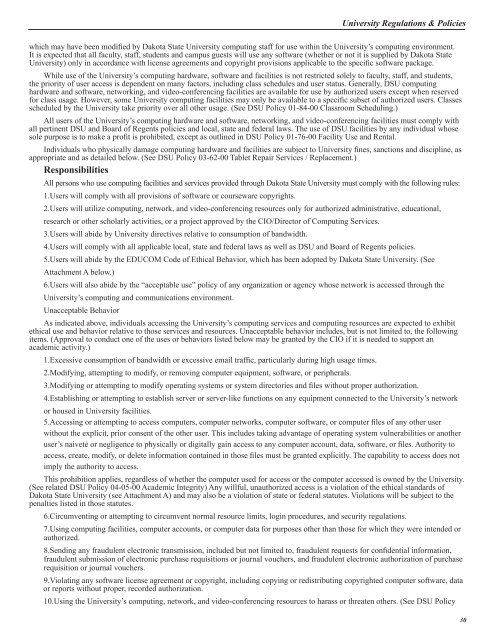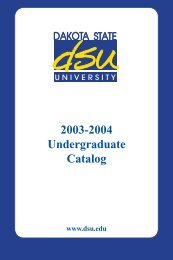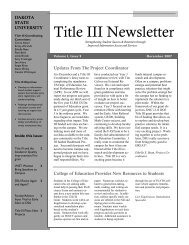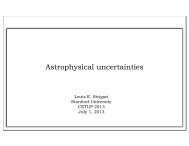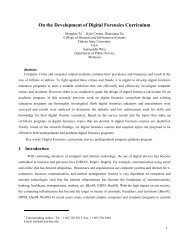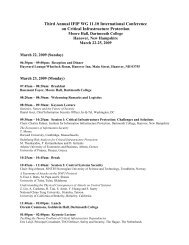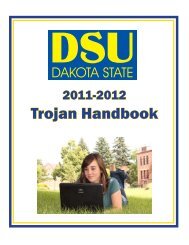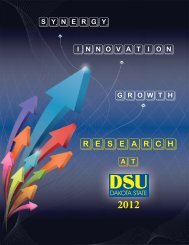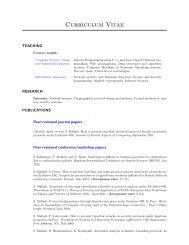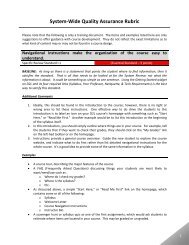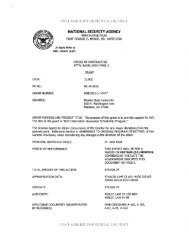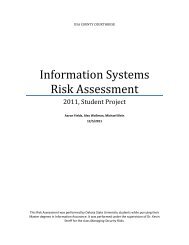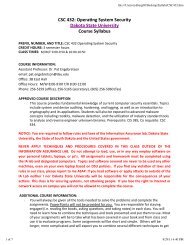Academic Calendar – Fall 2012 - Dakota State University
Academic Calendar – Fall 2012 - Dakota State University
Academic Calendar – Fall 2012 - Dakota State University
Create successful ePaper yourself
Turn your PDF publications into a flip-book with our unique Google optimized e-Paper software.
<strong>University</strong> Regulations & Policies<br />
which may have been modified by <strong>Dakota</strong> <strong>State</strong> <strong>University</strong> computing staff for use within the <strong>University</strong>’s computing environment.<br />
It is expected that all faculty, staff, students and campus guests will use any software (whether or not it is supplied by <strong>Dakota</strong> <strong>State</strong><br />
<strong>University</strong>) only in accordance with license agreements and copyright provisions applicable to the specific software package.<br />
While use of the <strong>University</strong>’s computing hardware, software and facilities is not restricted solely to faculty, staff, and students,<br />
the priority of user access is dependent on many factors, including class schedules and user status. Generally, DSU computing<br />
hardware and software, networking, and video-conferencing facilities are available for use by authorized users except when reserved<br />
for class usage. However, some <strong>University</strong> computing facilities may only be available to a specific subset of authorized users. Classes<br />
scheduled by the <strong>University</strong> take priority over all other usage. (See DSU Policy 01-84-00 Classroom Scheduling.)<br />
All users of the <strong>University</strong>’s computing hardware and software, networking, and video-conferencing facilities must comply with<br />
all pertinent DSU and Board of Regents policies and local, state and federal laws. The use of DSU facilities by any individual whose<br />
sole purpose is to make a profit is prohibited, except as outlined in DSU Policy 01-76-00 Facility Use and Rental.<br />
Individuals who physically damage computing hardware and facilities are subject to <strong>University</strong> fines, sanctions and discipline, as<br />
appropriate and as detailed below. (See DSU Policy 03-62-00 Tablet Repair Services / Replacement.)<br />
Responsibilities<br />
All persons who use computing facilities and services provided through <strong>Dakota</strong> <strong>State</strong> <strong>University</strong> must comply with the following rules:<br />
1.Users will comply with all provisions of software or courseware copyrights.<br />
2.Users will utilize computing, network, and video-conferencing resources only for authorized administrative, educational,<br />
research or other scholarly activities, or a project approved by the CIO/Director of Computing Services.<br />
3.Users will abide by <strong>University</strong> directives relative to consumption of bandwidth.<br />
4.Users will comply with all applicable local, state and federal laws as well as DSU and Board of Regents policies.<br />
5.Users will abide by the EDUCOM Code of Ethical Behavior, which has been adopted by <strong>Dakota</strong> <strong>State</strong> <strong>University</strong>. (See<br />
Attachment A below.)<br />
6.Users will also abide by the “acceptable use” policy of any organization or agency whose network is accessed through the<br />
<strong>University</strong>’s computing and communications environment.<br />
Unacceptable Behavior<br />
As indicated above, individuals accessing the <strong>University</strong>’s computing services and computing resources are expected to exhibit<br />
ethical use and behavior relative to those services and resources. Unacceptable behavior includes, but is not limited to, the following<br />
items. (Approval to conduct one of the uses or behaviors listed below may be granted by the CIO if it is needed to support an<br />
academic activity.)<br />
1.Excessive consumption of bandwidth or excessive email traffic, particularly during high usage times.<br />
2.Modifying, attempting to modify, or removing computer equipment, software, or peripherals.<br />
3.Modifying or attempting to modify operating systems or system directories and files without proper authorization.<br />
4.Establishing or attempting to establish server or server-like functions on any equipment connected to the <strong>University</strong>’s network<br />
or housed in <strong>University</strong> facilities.<br />
5.Accessing or attempting to access computers, computer networks, computer software, or computer files of any other user<br />
without the explicit, prior consent of the other user. This includes taking advantage of operating system vulnerabilities or another<br />
user’s naiveté or negligence to physically or digitally gain access to any computer account, data, software, or files. Authority to<br />
access, create, modify, or delete information contained in those files must be granted explicitly. The capability to access does not<br />
imply the authority to access.<br />
This prohibition applies, regardless of whether the computer used for access or the computer accessed is owned by the <strong>University</strong>.<br />
(See related DSU Policy 04-05-00 <strong>Academic</strong> Integrity) Any willful, unauthorized access is a violation of the ethical standards of<br />
<strong>Dakota</strong> <strong>State</strong> <strong>University</strong> (see Attachment A) and may also be a violation of state or federal statutes. Violations will be subject to the<br />
penalties listed in those statutes.<br />
6.Circumventing or attempting to circumvent normal resource limits, login procedures, and security regulations.<br />
7.Using computing facilities, computer accounts, or computer data for purposes other than those for which they were intended or<br />
authorized.<br />
8.Sending any fraudulent electronic transmission, included but not limited to, fraudulent requests for confidential information,<br />
fraudulent submission of electronic purchase requisitions or journal vouchers, and fraudulent electronic authorization of purchase<br />
requisition or journal vouchers.<br />
9.Violating any software license agreement or copyright, including copying or redistributing copyrighted computer software, data<br />
or reports without proper, recorded authorization.<br />
10.Using the <strong>University</strong>’s computing, network, and video-conferencing resources to harass or threaten others. (See DSU Policy<br />
30


